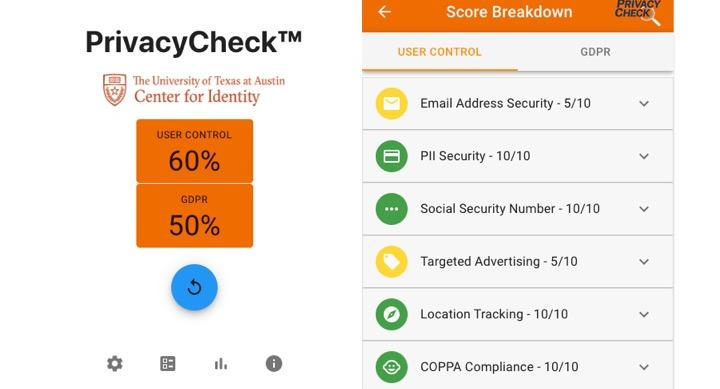
Critical Need
Consumers deserve transparency and notification describing the collection and sharing of their personal data, and a return on its value. In other words, when consumers give up personal data, what do they get in return? Organizations use a consumer’s personal data, and how they do so is basically unknowable—studies show that privacy policies now require a postgraduate degree to decipher and only 1% of us even make the effort. In 85% percent of the more than 600 policies studied by the Center for Identity at The University of Texas, organizations declare their right to change their policies, and continued use of their products are considered consent to those changes (even if the consumer has no idea of the changes). So, as a real matter, consumers have no awareness, and also no control. Additionally, organization need a means to easily evaluate their privacy policies against current regulations and compare their privacy policies against those of competitors.
Research Program Abstract
PrivacyCheck is a browser add-on tool that analyzes the text of online privacy policies by automatically summarizing online privacy policies and providing consumers an overview of the ways in which organizations use their personal data in a graphical, at-a-glance format. PrivacyCheck also assesses privacy policies with respect to regulations such as the General Data Protection Regulation (GDPR) and suggests competitors with better privacy policies in the same market sector. Similar, currently available resources fall short of this goal due to their lack of comprehensive web coverage. For example, TRUSTe and P3P are sign-up services that require a business to enroll in order to participate, and multiple crowd-sourced efforts only provide information for websites that have been manually checked. PrivacyCheck surpasses existing add-ons, apps, and certifications by using a data mining algorithm to access the text of any webpage. The user provides the URL for the company’s privacy policy and PrivacyCheck searches the page, returning scores that indicate the level of risk for several types of PII.
Potential Impact
The UT CID PrivacyCheck has been shown to more than double user attention and comprehensions of privacy policies. For organizations, the challenge is compliance to the latest privacy regulations. PrivacyCheck scores privacy policies against the key GDPR mantras and FTC guidelines. PrivacyCheck answers 20 basic questions concerning the privacy and security of user data, what information is gathered from them, and how this information is used. This UT CID project aims to improve the quality of privacy policy summarization and scoring as well as to increase the actionable knowledge provided by PrivacyCheck. The UT CID PrivacyCheck delivers the following innovations:
- Innovation #1: Helping users understand the privacy policies they “Click to Agree”
- Innovation #2: Gauging user comfort levels with privacy policies
- Innovation #3: Finding competitors with better privacy policies
- Innovation #4: Increasing visibility for privacy-enhancing policies and privacy-invading policies.
- Innovation #5: Scoring privacy policies against key policy regulations such as GDPR.
You can download the Chrome version of the Privacy Check browser plugin here:
PrivacyCheck for Google Chrome
The new and improved version 2 provides faster results, an assessment of the privacy policy with respect to the General Data Protection Regulation (GDPR), new interface, top 3 competitors with better privacy policies in the same market sector, and many more!
PrivacyCheck is a browser add-on intended to provide consumers an overview of the ways in which companies use their personal data in a graphical, ‘at-a-glance’ format. Similar, currently available resources fall short of this goal due to their lack of comprehensive web coverage. For example, TRUSTe and P3P are sign-up services that require a business to enroll in order to participate, and multiple crowd-sourced efforts only provide information for websites that have been manually checked.
PrivacyCheck surpasses existing add-ons, apps, and certifications by using a Data Mining algorithm to access the text of any webpage. The user provides the URL for the company’s privacy policy and PrivacyCheck searches the page, returning icons that indicate the level of risk for several types of PII.
Copyright © 2020 The University of Texas at Austin, Center for Identity, All Rights Reserved.
Contact: research@identity.utexas.edu
